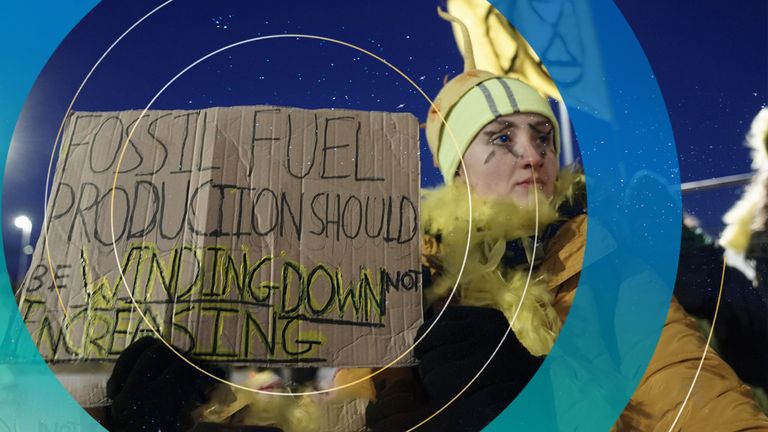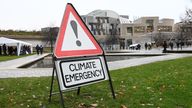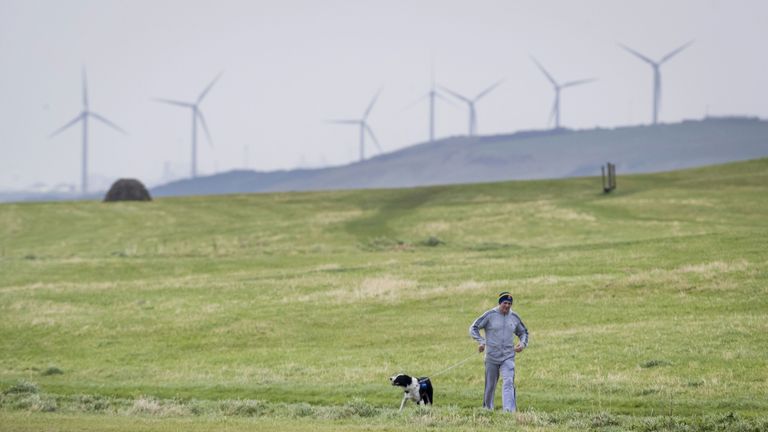Climate change: No gas boilers to be sold by 2025 to reach net zero
A report by the International Energy Agency says the sale of new petrol and diesel cars around the world would end by 2035.
Wednesday 19 May 2021 12:38, UK
No new fossil fuel boilers should be sold from 2025 if net-zero emissions goals are to be met by 2050, the International Energy Agency (IEA) says.
The Net Zero by 50 report published on Monday said no new coal mines are needed from now on as coal demand is on the decline, and there is also no place for oil or gas exploration or supplies.
By 2035, it said the sale of new petrol and diesel cars around the world would end.
Continuing to put money into oil and gas projects may be "junk investments" and it could throw domestic climate targets off course, the executive director of the IEA told Sky News.
"The UK is making exemplary steps in climate when you look at what it is doing at home and abroad," Dr Fatih Birol said.
"But if they still give licences for coal or oil or gas investments or exploration, this might contradict with their own domestic climate goals."
The UK government recently came under criticism - including from its own Climate Change Committee - after it did not initially intervene in plans from Cumbria County Council to build a new deep coal mine, the first of its kind for 30 years.
A public inquiry has since been announced into the Whitehaven Colliery plans and the government has "called in" the mine application, meaning it has the final say on whether it goes ahead.
A recent decision by the government to not rule out new oil and gas licences in the North Sea was also met with anger from green groups, with Greenpeace describing it as "a colossal failure in climate leadership".
"The world does not need any new investments in oil, coal or gas. Some investors, some governments can still go ahead and make investments in the exposure of the new oil fields or opening new coal mines," Dr Birol said.
"This is up to them to decide. But this is not in line with reaching our climate targets."
The International Energy Agency (IEA) has now released its first net-zero energy guide for decision-makers in the lead up to the COP26 climate meeting, hosted by the UK, in Glasgow in November.
Climate pledges by governments to date - even if fully achieved - "would fall well short of what is required to bring global energy-related carbon dioxide (CO2) emissions to net-zero by 2050 and give the world an even chance of limiting the global temperature rise to 1.5C", according to the report.
Dr Birol said the pathway to overhauling the world's energy system is "narrow but still achievable if we act immediately".
Subscribe to ClimateCast on Spotify, Apple Podcasts, or Spreaker
The IEA sets out the key steps to creating clean energy systems as:
- Making the most of the existing clean energy solutions, such as solar and wind
- Prioritising the development of clean energy technologies that can help accelerate our move away from carbon-intensive industries like aviation, steel and cement
- Drastically reducing the use of fossil fuels oil, gas and coal
The report is designed to "inform the high-level negotiations taking place at COP26" between governments, but can also be used by bodies assessing investment risks and developing energy strategies.
The IEA says this transition cannot happen without sustained support and participation from citizens, whose lives will be affected by all the changes.
"The clean energy transition is for and about people," Dr Birol said.
Sky News has launched the first daily prime time news show dedicated to climate change.
The Daily Climate Show is broadcast at 6.30pm and 9.30pm Monday to Friday on Sky News, the Sky News website and app, on YouTube and Twitter.
Hosted by Anna Jones, it follows Sky News correspondents as they investigate how global warming is changing our landscape and how we all live our lives.
The show also highlights solutions to the crisis and shows how small changes can make a big difference.




